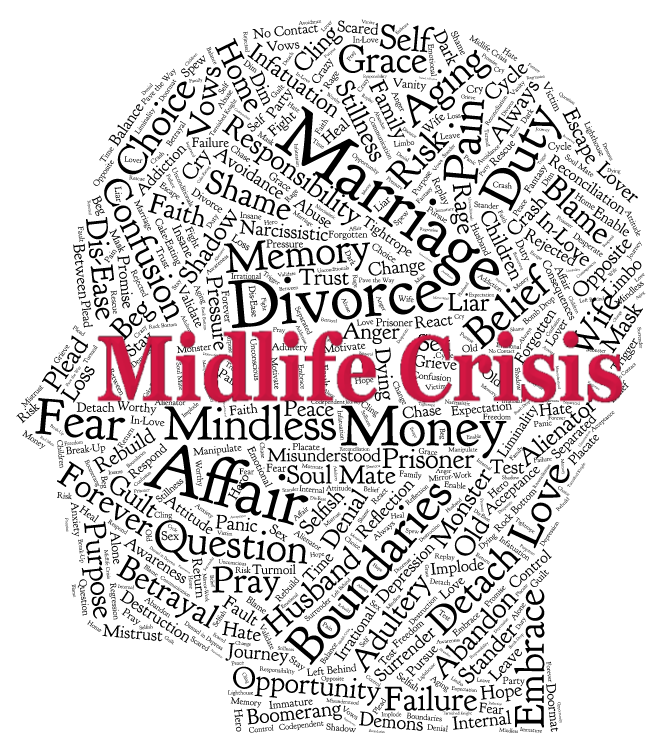Part I: Midlife Crisis

What is a Midlife Crisis?
Trends come and go. Since the 1970s there have been various studies about Midlife Crisis (MLC). A common initial theory was that a Midlife Crisis was an inevitable transitional event; subsequent data collected through a variety of methods has a wild range across the scale and the MLC definitions used are varied. A common definition labels MLC as emotional turmoil between 35 and 50 caused by fears and anxieties regarding aging. Much of the studies were surveys given wherein the data was self-reported. My definition of MLC is stricter and I find self-reporting to be possibly the least reliable source--since MLCers deny they are having an MLC, during the crisis and may deny their past experience once the crisis is complete. So how common is a Midlife Crisis; how many people have one of their own?
My answer: it doesn't matter. I am not writing to offer or prove statistics. If you are reading this because you are experiencing crisis--indirectly in this context, then it doesn't matter if only 5% of your peers are having a similar experience; it doesn't matter if it only happens to left-handed green-eyed men who marry trapeze artists. What matters is that it is happening to you and your spouse; your experience is real and painful and you need help, support and direction.
The articles created for this section will review Midlife Crisis in greater depth than this brief introduction. I'm sure there are several variants of MLC that do not fit my descriptions. I don't want to debate the meaning; instead I'll review what I mean by the term. It is not my intention to deny someone else's experience, but this website refers to a specific type of MLC.
There are many who insist that a Midlife Crisis is a journey to be celebrated. It is true that Midlife is a journey to be embraced and celebrated. Everyone who survives long enough will experience a Midlife Transition (MLT). Not all transitions are crises, but all MLCs are MLTs. Midlife Crisis is not a clinically treatable psychiatric disorder or mental illness. It is a normal life event--midlife transition--that has escalated to crisis levels of emotional and mental difficulties. Midlife Transition is a time for Self-questioning, thus it is a quest. It is about change; denial and attempts to avoid the transition yield crisis. The crisis is not a disease but Dis-Ease. Midlife is a necessary journey toward greater Self, spiritual growth and awareness; it is a reason to rejoice as a person becomes a butterfly.
Midlife Crisis is not gender-specific. I do not know if the numbers of male versus female MLCers are equal. But my experience has shown me that more women seek support through websites such as this and thus I apologize, but I will refer to the MLCer as a male more often than as a female. My own experience is with a male MLCer and thus I have researched and understand this aspect better.
What is different about a person who embraces the journey from one who denies it?
Key Components of a Midlife Crisis
- Depression - Covert & Overt
- The Urge to Abandon
- Infidelity
- Blaming or Projecting (Denial of Responsibility)
- Personality Changes or Mood Swings
Depression
Self-reflection is a component of midlife, and this may include depression even for those whose transitions do not reach crisis levels. The easier the person falls into a depression, the more likely it is not a crisis. Depression permeates Midlife Crisis, it forces reflection which is a confrontation with one's fears, and thus it is this feeling of depression which the MLCer is trying to escape.
Chapters in Part I
Chapter 2: Midlife Crisis Overview
- Overview
- Midlife Crisis Stages
- Contact Types
- Contact Types: Clinging Boomerang
- Monster
- Depression Overview
- Blind to Destruction
- Accommodation
Chapter 3: Separation
Chapters 4 and 5: Liminality, Rebirth and Reintegration
- MLC Phase 2: Liminality
- Transition is Liminal
- When is Liminality?
- MLC Phase 3: Rebirth & Integration: A Brief Introduction
Chapter 6: Turmoil & Chaos
Chapter 7: Understanding Infidelity
- Introduction
- Why Her?
- In-fatuation Vs. In-Love
- Science Vs. Love
- Breaking Up is Hard
- Love & Hate
- Love & Indifference
Chapter 8: Affair & MLC Personality Dynamics
The Urge to Abandon
Most MLCers will move out, not all, but most. Some will take legal action, but many more will threaten without acting or make no mention of legal changes. Words or promises spoken as a conscious lie may be inadvertent truths. MLCers leave, often saying that it is only temporary, they will be back. Some mean these words and are not aware that temporary is longer than their imagination, some want to mean them, but lack trust within themselves, and others are using them as words of appeasement with no honest intentions. Almost all are unaware of their rapidly cycling emotions and that they will change their minds in an hour, day, week or month--possibly multiple times. Some leaving MLCers tell their spouse they must leave, either directly stating or implying their actions are beyond their control. This is truth, he must go through the journey; he must leave and become separate if he is to return and become whole. But he is not aware of the depth of truth within his words.
Infidelity
Though this is merely a symptom of the Dis-Ease, it is often the most painful and public. It is not a litmus test for determining MLC. An affair is about a relationship--the MLCer forms a bond with the other person. Most midlife affairs become sexual (physical), but there are some who have Internet affairs, emotional affairs or use pornography instead. It is a rare few who do not cheat on their spouse in some form.
Blaming or Projecting
In order to avoid Self-reflection and responsibility, the MLCer blames the spouse. Often he will rewrite history, stating the marriage has been falling apart for years. Midlifers hurl accusations: you are the bad guy, you are in denial, you are the one who is confused, you are vindictive; often these are all things the MLCer subconsciously feels about himself.
Personality Changes or Mood Swings
Guilt, confusion and fear yield changing moods. You may feel like you are living with a Manic Depressive--perhaps you are, but Midlife Crisis is like Manic Depression; it doesn't mean your spouse is clinically diagnosable as Bipolar. Some change moods every few minutes, whereas others may change over weeks. They may manifest through anger, reckless behavior or passivity. Some change their minds about leaving every few minutes or weeks, while others leave and seem consistent with their choice. What is noticeable is that they seem like a different person some or all of the time.
Do you feel like a deer about two seconds after seeing the headlights?

You know you’ve gotta stop crying, panicking or asking your spouse ANYTHING. And you know you should let-go and give space so that you can learn to respond and communicate with your spouse from a place of calm rather than emotional hurt.
Introducing
Understanding Midlife Crisis
The foundational course to give you answers and clarity into "What the he!! Is going on with my spouse!"